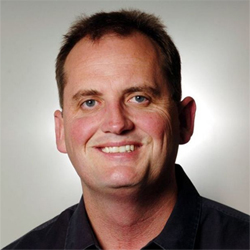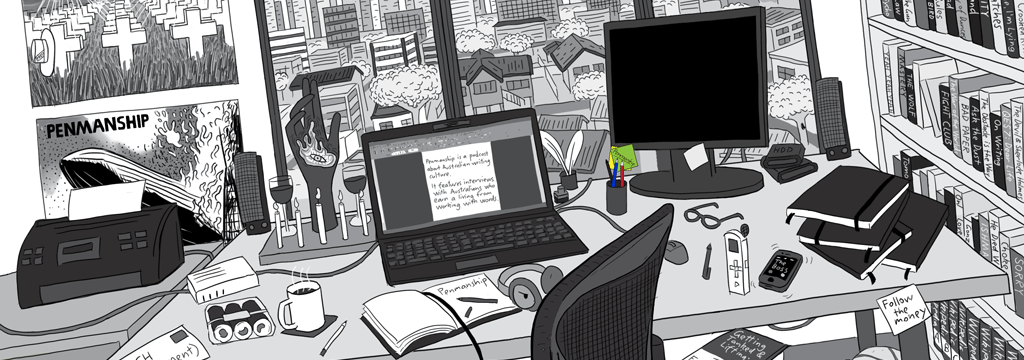Hedley Thomas is an author and national chief correspondent at The Australian.
 He has been a journalist for 30 years, most of the time while based in Queensland: first on the Gold Coast, and later in Brisbane, where he is based while reporting for The Australian. A multiple Walkley Award winner, Hedley has been involved in some of the biggest national stories of this century, including investigations into the wrongful arrest of a suspected terrorist, a natural disaster whose damaging floodwaters could have been avoided, and the behaviour of a negligent surgeon.
He has been a journalist for 30 years, most of the time while based in Queensland: first on the Gold Coast, and later in Brisbane, where he is based while reporting for The Australian. A multiple Walkley Award winner, Hedley has been involved in some of the biggest national stories of this century, including investigations into the wrongful arrest of a suspected terrorist, a natural disaster whose damaging floodwaters could have been avoided, and the behaviour of a negligent surgeon.
In 2007, he published a book named Sick To Death about the latter of these three stories. Most of the action in that tale took place in my hometown of Bundaberg, where the actions of a surgeon named Dr Jayant Patel brought the failings of the Queensland health system into sharp focus.
I first met Hedley at the Queensland Clarion Awards in August, and this interview took place at his home in Brisbane’s western suburbs on a public holiday in early October. You’ll hear birdsong in the background, including the occasional chicken. Our conversation touches on his first job in journalism as a copy boy at The Gold Coast Bulletin; his promotion to News Limited’s London bureau in his early 20s and some of the momentous world events he covered as a foreign correspondent; the mechanics of filing stories in the pre-email era; how he discovered some of the biggest stories of his career, and how journalism came close to killing him on two occasions.
Hedley Thomas, 48, would like to be a professional racetrack punter but as that would bankrupt his family he instead works as a Brisbane-based journalist for The Australian. He is the winner of five Walkley awards including a Gold, and two Sir Keith Murdoch awards. He is the author of true crime book Sick To Death, father to two precocious teenagers, and husband of Ruth.
Hedley Thomas’s writing for The Australian: http://www.theaustralian.com.au/author/Hedley+Thomas
Direct download | iTunes | Stitcher | Libsyn | YouTube
Timeline
2.00 The origins of Hedley’s job title at The Australian, ‘national chief correspondent’
3.30 What Hedley is working on at the moment, including looking at parallels between the current Royal Commission into trade union corruption and one that took place in Melbourne in the 1980s, looking into the Builders Labourers Federation (BLF)
5.00 How Hedley chooses the stories that he pursues, the degree of autonomy he has in his job, and balancing long-term investigations with stories that can be turned around relatively quickly
8.30 The advantages of operating out of Brisbane, rather than being based at The Australian‘s Sydney newsroom
9.30 How Hedley pitches to Shane Rodgers, the Queensland editor at The Australian
11.00 What brought Hedley into journalism: “I always enjoyed reading the news”
12.00 Hedley moved to Queensland when he was about 12, and went to Surfers Paradise State School, then Keebra Park State High, and considered following his father into the Royal Australian Air Force
14.00 Hedley is the second eldest child of four. His eldest sister, Peta, now lives on a Greek Island; Rebecca is “the celebrity of the family”, and is chair of the Gold Coast Titans rugby league club, and his youngest sister, Kate, lives in Sydney and married Paul Whittaker, editor of Sydney newspaper The Daily Telegraph
16.30 “I look at the prominence that I sometimes have in journalism a bit differently to others. I often feel a bit uncomfortable with it”
18.30 How Hedley’s first journalism job at The Gold Coast Bulletin came about, by following in the footsteps of fellow Penmanship guest Matthew Condon. He started as a copy boy, a week after finishing after high school
20.30 Hedley describes his copy boy role as being “an errand boy”, picking up stories from journalists and transferring them to the typesetters, among many other jobs
22.00 Hazing rituals for copy boys included being asked to go to photographics and fetch “the long wait”
23.00 “Growing up on the Gold Coast can help you develop a great BS detector […] it helps you sort the wheat from the chaff, and come to a view about peoples’ honesty and integrity”
26.30 Having his own desk as a copy boy made Hedley fantasise about what it’d be like to be a reporter at The Gold Coast Bulletin
28.00 “When I look back, I think it’s amazing that I even lasted in journalism, because I just feel like I was so intellectually clumsy and naive”
30.00 Hedley shared a flat in Southport with Paul Whittaker, who started about a year after Hedley did. They’d routinely head to the Bulletin printing press, “and be ripping the paper to bits, looking for our stories, cursing the editor who hadn’t put it on the front page”
31.00 The first money Hedley ever earned was a sideline business with a friend at around the age of 13, door-knocking and installing peep-holes around Surfers Paradise, charging about $10
33.30 He also worked at McDonald’s in Cavill Avenue, Surfers Paradise, which was “unreal”, for three or four years
35.30 Hedley briefly went back to McDonald’s while working at the Bulletin, intending to quickly pay off some loans, then started seeing some colleagues come into the store, and decided he was too proud to be seen dressing burgers
37.00 He was eventually hired as a reporter at the Bulletin, starting first in sports writing
40.00 Hedley explains his lifelong attraction to horse racing, the stories of the racetrack and “the art of jockeying”
44.30 “For me, it’s about the fun that you have with your friends, and the spectacle of it”
48.00 For crime reporters, “there’s a tendency to fall victim to a bit of Stockholm syndrome”, by relying too heavily on friendly police contacts
49.00 How Hedley engaged with criminal sources and locales as a crime reporter, to hear the other side of the story to what the police were telling him
53.00 Working the police round meant that Hedley was exposed to death for the first time, such as while covering car accidents on the highway
55.00 Witnessing these kinds of things weren’t openly discussed among colleagues in the newsroom
56.00 Hedley started as at the Bulletin in 1984, then went to The Courier-Mail in mid-1988 after being encouraged to make the move to Brisbane by some colleagues
58.00 After a year at The Courier, Hedley’s editor, Greg Chamberlin, asked if he’d be interested in heading to London as a foreign correspondent
60.00 His reporting ranged from covering Wimbledon to the fall of the Berlin Wall and the Gulf War
62.00 Hedley was in Romania in late 1989 with Nicolas Rothwell, who is now a fellow correspondent at The Australian
65.00 What he saw on this trip to Romania profoundly affected Hedley, who found himself unable to join in New Year’s Eve celebrations in London
66.30 “I was describing momentous events; events that would produce hundreds of books. How do you do that justice?”
69.00 The mechanics of filing stories as a foreign correspondent in the early 1990s, pre-email
71.30 “I remember spilling beer on my laptop when I was trying to do half a dozen previews for the French Open at Roland Garros
72.00 Hedley returned from London at the end of 1991 to The Courier-Mail, and “thought I was a much more experienced, worldly, wise kid”, but was put back on police rounds
73.00 One of his assignments in Berlin was to try to package up several tonnes of Berlin Wall to be shipped to Australia, as the Daily Mirror‘s then-editor wanted to cut these up into thousands of pieces as mementos for the newspaper’s readers
74.30 Hedley met his wife, Ruth Mathewson, at the opening of Rics Cafe in Brisbane, and was immediately sure that he wanted to marry her. She was a journalist, too, then working for The Sunday Telegraph; they went to Hong Kong together for six years, then Hedley returned to The Courier in 1999
77.30 How the story of Bundaberg surgeon Dr Jayant Patel crossed Hedley’s desk in 2005, after a tip from Bundaberg Base Hospital nurse Toni Hoffman
83.00 “I thought, what they’re saying in Bundaberg is really interesting, but how do I corroborate it?”
84.00 After that meeting with Hoffman and other nurses, he returned to the office and “just started playing with Google”, which produced the first evidence of Patel’s pattern of behaviour outside of Bundaberg
85.00 “I just knew that the story was going to explode as a result of this finding, because for a couple of years, the hospital administrators had been defending Patel”
86.30 “It’s almost embarrassing that such a simple check could produce such a serious identification of a problem”
87.00 Hedley later wrote a book about the Patel story, Sick To Death: A Manipulative Surgeon and a Health System In Crisis – A Disaster Waiting To Happen, which was published by Allen & Unwin in 2007. He was encouraged to pursue the idea by his friend and colleague Matthew Condon
90.30 He became concerned that the book could be lost if something happened to him, so he bought half a dozen cheap memory sticks and hid them around the house
91.30 Hedley is quite keen on writing a book about a horse named Dunlop that won the Melbourne Cup about 125 years ago, and which was owned and raced by his great-great-grandfather
93.30 How Hedley came across the series of stories that he wrote about the 2011 Brisbane floods, and the flawed operation of the Wivenhoe Dam
98.30 “When we started running that story, it was almost as if we were being unpatriotic”
102.30 “I think it’s the most important story I’ve ever done, because it was done at a time when you knew there were very powerful forces who weren’t interested in the story”
110.00 In October 2002, there was a shooting at Hedley’s house, when he and his family were all in bed. “There were four bullets fired from the driveway, and one of the bullets went through the glass, just above our heads, in the bedroom”
111.30 “For quite some time after that, I found it quite difficult to focus on the job”
112.00 For months afterwards, Hedley would be asked innocent questions about the shooting by friends and family, and would find himself tearing up at the memory as a result of post-traumatic stress
115.30 “It was a tough time, but we got through it. There were two or three years where I still had that kind of response, and now it’s fine”
116.30 “It also taught me that you really have to draw on your own inner reserves, and your family’s love, to get through situations like that”

